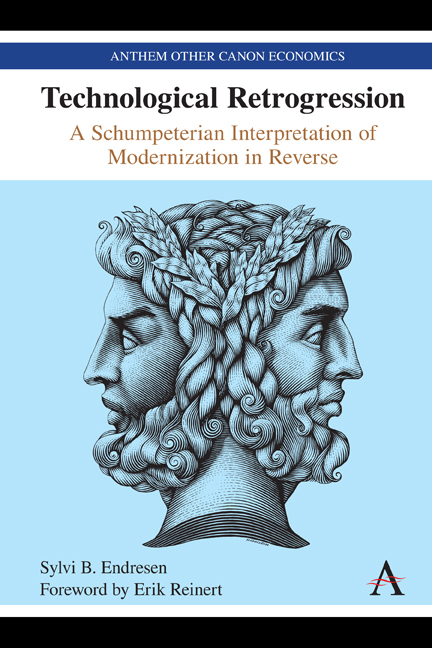Book contents
- Frontmatter
- Dedication
- Contents
- List of Figures
- Foreword
- Acknowledgements
- Preface: The Book within This Book
- Introduction: The Concept of Technological Retrogression
- 1 Challenging Linearity and Irreversibility
- 2 Perspectives on Technological Heterogeneity
- 3 Production Systems and Work Histories
- 4 Empirical Evidence of Technological Retrogression: The Sri Lankan Case
- 5 Empirical Evidence of Technological Retrogression: The Malaysian Case
- 6 A Theory of Technological Retrogression
- References
- Index
1 - Challenging Linearity and Irreversibility
Published online by Cambridge University Press: 17 June 2021
- Frontmatter
- Dedication
- Contents
- List of Figures
- Foreword
- Acknowledgements
- Preface: The Book within This Book
- Introduction: The Concept of Technological Retrogression
- 1 Challenging Linearity and Irreversibility
- 2 Perspectives on Technological Heterogeneity
- 3 Production Systems and Work Histories
- 4 Empirical Evidence of Technological Retrogression: The Sri Lankan Case
- 5 Empirical Evidence of Technological Retrogression: The Malaysian Case
- 6 A Theory of Technological Retrogression
- References
- Index
Summary
Grand narratives of progress
The reversal of modernization has been given little attention in social science. In this chapter this is discussed in terms of preoccupation with progress, dominant in Western thought. This idea may overshadow any doubts we may have and make it difficult to observe modernization in reverse: Do we only observe what we are ‘programmed’ to believe in? Do we have ‘progressive lenses’? If so, it is difficult to challenge linearity of history, or evolutionism, that societies move – eventually – in the same direction. A discussion on how technological retrogression may be studied as well as a brief introduction to the empirical evidence presented in later chapters follows. The chapter then introduces how technological retrogression can be cast in Schumpeterian terms, the ‘Schumpeter in reverse’ question treated in the preface.
The grandest perspectives within history and social sciences concern the evolution of human society and the rise and fall of civilizations. Might the phenomenon of technological retrogression be discussed in terms of such grand narratives? For instance, could it be an indicator of decline or decay during the fall, or a process running counter to general conceptions of the direction of evolution? We would then look for evidence of this phenomenon during periods when empires disintegrate and vanish, and during prolonged crises of societies. Grand narratives are more concerned with progress than with decline. In The History of Progress, Nisbet claims that between 1750 and 1900, the idea of progress ‘reached its zenith in the Western mind in popular as well as scholarly circles. From being one of the important ideas of the West it became the dominant idea’ (Nisbet 2009, 171). Progress provided the developmental context for ideas such as equality, social justice and popular sovereignty. Philosophers of that time, Turgot, Condorcet, Saint- Simon, Comte, Hegel, Marx and Spencer, saw history as a slow, gradual but continuous and necessary ascent to some given end. Linearity in historical analyses was born.
Grand narratives proclaiming progress as ‘an inexorable march of mankind’ (Nisbet 2009, 171) do not generally obtain the status of theory in social science, where researchers concentrate on contemporary issues and testable hypotheses. But social science abounds with grand narratives, concepts of which are ingrained in our language, scientific and vernacular. In a historical perspective, postmodernists’ proclamation of the death of grand narratives is very recent and has yet to obtain hegemonic status.
- Type
- Chapter
- Information
- Technological RetrogressionA Schumpeterian Interpretation of Modernization in Reverse, pp. 11 - 22Publisher: Anthem PressPrint publication year: 2021

